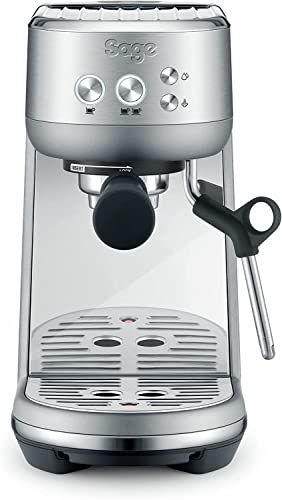Benefits of an Espresso Machine
In an espresso machine, hot water is forced under pressure to a high temperature through finely ground coffee beans. This produces a smooth, rich drink referred to as espresso.
The first espresso machines were powered by steam. These machines utilize a single boiler to brew several drinks at once. The water is close to boiling when it reaches the "group head," where a portafilter locks in place.
Health Benefits
The caffeine in espresso can lift someone's mood. This is particularly beneficial for those who suffer from depression, as it can lift their spirits and give them the push they require to get through their day. It also helps with fatigue, which is another common sign of depression. It has also been proven to improve short-term memory, as well as the ability to solve problems. These advantages are also beneficial for employees in the office who need to remember specific details about projects and deadlines.
With an espresso machine at home, people can enjoy an excellent cappuccino or a cup of coffee whenever they like. This can save them the cost of going out to a coffee shop, and the time needed to drive there. It's also more convenient to serve drinks that taste great at home while entertaining family or
espresso machines friends.
It is crucial to consider the ease of use, and whether there are additional features such as an integrated milk frother or grinder when you are choosing an espresso machine. It is also a good idea to know how many drinks the machine can make simultaneously and whether it comes with a steam wand for making lattes.
Energy Boost
It is easy to have an espresso maker at home in case you wish to serve guests a delicious espresso. It also saves you money on coffee shop visits. It is recommended to purchase an espresso machine with a manual mechanism that lets you adjust the amount of coffee and water used, allowing you to control the intensity of your espresso and how much foam (crema) is produced.
A majority of appliance stores sell an espresso maker manual. These machines typically come with a portafilter that is filled with ground beans and compress in a process called "tamping." You'll need to pump a lever to create the high pressure required to extract flavor from the beans. Some models include steam wands that can be used to heat and froth milk to make beverages like lattes and cappuccinos.
A newer development in
espresso machines is the super-automatic machine that's like a regular automatic but offers greater consistency. These machines are programmed to make an exact size espresso. They are easier to use, and have earned top marks in Lab testing. They can grind beans, measure and tamp them at the touch of a button. Some models include a built-in grinder for coffee and can make espresso, brewed or coffee that has been brewed. However, they are more expensive than semi-automatic and manual machines.
Anti-Inflammatory
Coffee and espresso can give you an energy boost however they should be consumed in moderation. This can help avoid digestive issues, anxiety and high caffeine levels. It is also essential to drink a high-quality cup of coffee to avoid the artificial ingredients that are used in low-quality espressos, which can be detrimental to your health.
Research has revealed that the polyphenols in coffee, including CGA are anti-inflammatory. They have bacteriostatic effects and anti-bacterial properties on a wide range of harmful microorganisms, which can thrive in different parts of the human body. These include oral bacteria that cause caries, as well as intestinal bacteria.
The two diterpenes responsible for coffee's unfiltered adverse effects, cafestol & Kawheol have also been discovered to have anti-inflammatory properties as well as antioxidant and anti-fibrotic properties. According to a study published in International Journal of Molecular Sciences Bioactive compounds could be responsible for the positive effects of coffee on human health. CGA has also been linked to lower incidences of diseases and a longer life span in various studies.
Lower Risk of Diabetes
Many are seeking ways to reduce their risk of diabetes in a society that is becoming more common. Coffee is a great way to reduce the risk. Caffeine in coffee increases metabolism and lowers blood sugar levels following meals. It also decreases the risk of type 2 diabetes by decreasing cholesterol levels. You should reduce the amount of coffee you consume each day. If you're sensitive, it is
best espresso maker that you limit your caffeine intake to a single cup per day.
A new study from Sweden confirms previous studies that link drinking
coffee machine espresso to a lower risk of type 2 diabetes. This study is different from others because it separated filtering coffee and boiling coffee to better understand the health benefits of coffee.
Researchers utilized a technique referred to as metabolomics alongside traditional dietary questionnaires. This technique is used to determine the presence of specific compounds in the body, and is extremely accurate compared to self-reported intakes from questionnaires. The researchers also controlled for variables like sex smoking status, smoking habits and the methods used to prepare coffee to keep out confounding factors from biasing the results.

While the results were obvious However, the scientists aren't certain of the precise mechanism behind the results. They believe that the beneficial effects of coffee could be due to diterpenes, which interfere with the absorption of glucose in the liver and enhance the metabolism of glucose. They plan to study these differences more in future research.